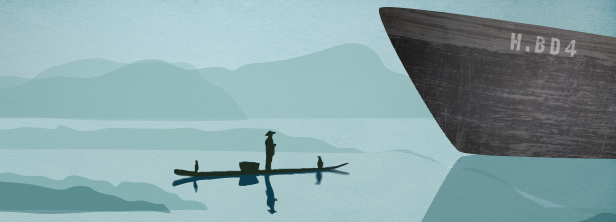The best and high-value fish of these fisheries are whisked off to higher-paying customers in developed nations, creating food security challenges. Additionally, certification programs require fish stock assessments based on data that most small nations can’t afford. The Marine Stewardship Council recently implemented alternative assessment criteria, but by and large, developing countries still lack effective on-ramps to improvement that can provide connections to markets, as well as better management. Finally, the insult added to all of this injury is the scourge of pirate trawlers, which illegally fish off the coastlines of developing nations that have little policing capacity, decimating the livelihoods of subsistence and small-boat fishers.
Challenges
In developing countries, traditional fisheries have been artisanal and decentralized, often relying on small-scale traders and processors. As fish stocks plummet, competition for dwindling catch is changing the social and cultural landscape. Those with access to capital and gear are concentrating landings at fewer sites, changing the locations of post-harvest facilities and consolidating ownership, which drives many small-scale fishers, processors, and traders out of business. Tempted by a growing export market, fishers use increasingly damaging methods to catch the in-demand fish to ship out of the country.
Pricing out local fishers for access
Wealthy nations can offer attractive deals to developing world governments: We’ll pay you to fish your waters. In 2006, the EU agreed to pay $700 million to Mauritania over six years—that money provides one-third of the nation’s annual budget. Lacking their own commercial fleets, many nations were happy to take cash in exchange for letting foreign fleets in. But these enormous fleets take all the fish, drive down prices, and leave local fishers with empty nets and more citizens with empty stomachs.
Destructive fishing
Fewer local fish, a growing lucrative export market, lack of regulation and enforcement, and the need to feed a family: all these factors incentivize fishers to do whatever it takes to catch a fish, including blowing up and poisoning marine habitats. Dynamite fishing turns reefs to rubble, but allows fishers to easily scoop up the dead fish that float to the surface; cyanide stuns fish so they can be taken alive, but leaves corals and other reef residents dead in the water.
Farming vs. Fishing
Fishing is often the last resort of the poor or a supplementary income/food source for diversified livelihood strategies. But increasingly scarce fish make this option less and less feasible. Aquaculture may offer more stable and profitable employment and food supply, but it requires capital, which makes it inaccessible to the poor.
Waste
In some regions, up to 30% of fish production is lost to bacterial and fungal infection or eaten by pests. A lack of adequate refrigeration or preservation technology, infrastructure, and access to markets drives enormous post-production loss, a waste that developing countries cannot afford.
Opportunities
Simple solutions
Ice availability and more up-to-date-refrigeration technology would go a long way toward reducing waste and improving the economic value of exported fish, as would better fish handling techniques.
Direct connect
Opportunities to more directly connect small-scale developing-world fishers with the premium markets of the developed world can return higher profits to fishers who need it most.
Locally grown management
NGOs are initiating partnership programs with local supply chains and communities to implement programs that combine designated access with marine protected areas. These locally customized initiatives limit access for fishing and let citizens lead and enforce. Rare’s “Fish Forever” program enlists local grassroots leaders to build community buy-in to care for their own marine ecosystems, while working with politicians to structure management policies that deliver environmental wins similar to, or better than, a certification process.





